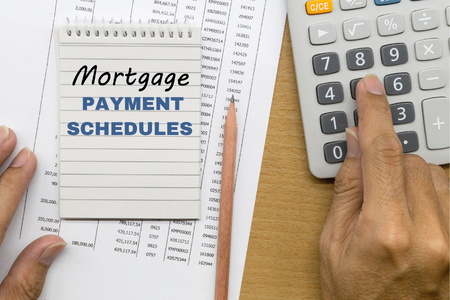Welcome To Our Mortgage Educational Blog About:
Getting Up To Speed About Mortgage Payment Schedules

A mortgage payment schedule outlines how much you will pay on your loan, also known as an amortization schedule. Your mortgage lender will create a program that divides your mortgage into equal or near-equal installments, and given that most people can negotiate the terms of their mortgage contracts, it’s important to choose a schedule that works best for you.
Understanding The Payment Schedule Of your Mortgage
This payment schedule shows the scheduled payments over the course of a loan’s term, a breakdown of the payments, as well as how much has been sorted and how much is left. Mortgage payments can typically be categorized into two types: those that include both the interest and its principal, and those that only pay interest.
#1) Principal and Interest (P&I)
This option divides your monthly mortgage payments between the amount paid to repay the principal (the original amount you borrowed) and the interest portion. Often referred to as “interest only” payments (P&I). Keep in mind that costs outside of your mortgage, like homeowners’ insurance, property taxes, and inspection fees, are often paid separately.
#2) Interest Payments
This option is where borrowers only make interest payments. It is not a common type of mortgage because the loan principal is not paid down when the term ends. This means that unless you make pre-payments, your balance will never change. Typically seen only with private lenders.
The P&I payment option pays the “P” principle, which is the amount owed on your initial loan. The second part of the mortgage payment “I” goes to covering the interest owed on your loan. Interest can be seen as the price of borrowing money. This is the lender’s profit on your loan. As mortgages can be risky, lenders want to recover their borrowed money as quickly as possible.
This makes it so your loan payments during the early days of the repayment period are in favor of the interest, not the principal. As you progress with paying and your lender begins to cover more of the cost of financing your loan, the payment breakdown will gradually move to greater principal payments— improving your home equity with time. Payments towards the end of your loan’s amortization period will have a larger impact on the repayment of the principal than at the beginning. The Payment Schedule of your mortgage helps you calculate the best plan customized for your current financial situation. If you make larger payments on your mortgage, that will decrease the overall number of payments on your mortgage. You will also reduce the amount of interest paid over time on your loan.
Mortgage Payment Schedules
There are a lot of factors to consider when choosing a mortgage payment schedule, such as interest rates and the length of the loan. It can be tempting to select a mortgage plan that requires smaller monthly payments spread over a longer period of time, but this may result in higher interest costs for you down the road. A more prudent approach is to choose a payment plan that will cover the entire loan in less time, ensuring you can sort your entire mortgage sooner rather than later.
There are a variety of payment schedules that you can explore to find the best option for your situation. Start by talking to a mortgage professional so that you can find what works best for you. They can show you how changing the size of your payments, frequency of payments, or interest rate of payments to see how they impact your overall costs. By choosing one repayment method above another, you can work out the entire savings of a particular payment plan.
Is It Worth Paying My Mortgage Faster?
Many homeowners find it more cost-effective to pay off their mortgage faster, but this isn’t always possible. With the current prices of houses in Canada and interest rates on mortgages increasing, more home buyers are taking on mortgages that they can’t afford to repay at an accelerated pace. A longer amortization schedule increases your mortgage’s interest costs throughout the lifetime of the loan, but a shorter schedule is not always feasible for home buyers in Canada these days. This is because of the current high-interest rates.
There are a few things you can negotiate with your mortgage lender so as to accelerate your mortgage payment schedule. This includes adjusting the terms of your loan, changing the interest rate, or extending the term of your loan.
Your amortization period is a key factor in how quickly you’ll sort out your mortgage. Increasing the size or frequency of your payments can shorten the amortization period of your mortgage. Make sure that the terms of your contract are outlined in advance if you want to shorten your amortization period. Many lenders do not allow borrowers to shorten their amortization periods, as this results in lost interest payments. However, many lenders allow acceleration of mortgage payments. This could be a lump sum annual payment up to a percentage of the total loan amount, or increased monthly mortgage payments. Make sure you discuss with your mortgage provider about the prepayment option.
A smaller mortgage is obviously easier to pay off and speed up the process. Making a larger down payment will help you save on interest and make it easier to pay off your mortgage loan quicker.
Take a look at many different interest rates when you are ready to take out a mortgage. You have the option of choosing either a variable interest rate or a fixed rate. A fixed-rate mortgage locks in the interest rate when you sign the contract. This can help protect you from fluctuations in interest rates over time. Variable-rate mortgage rates change according to the market.
However, when rates go up, you may lose out on some of your profits, but when rates fall you’ll be able to take advantage. If your mortgage’s interest rate is lower, it will easier for you to pay down your mortgage loan. Your rate should be one that is most beneficial to you.
Conclusion
Often times it can be difficult to get lenders on board with shortening your mortgage payment schedule. Most lenders would like you to keep your amortization period the same, as this will result in them making more money from your interest payments. This is where a mortgage broker comes into play. I will help you negotiate the best contract for yourself. To get you the best mortgage rates, I will need to gather information about your individual situation. With years of expertise and a vast network of lenders, I promise to work with you to get you the best mortgage for your needs.
If you would wish to inquire more on this topic, don’t hesitate to contact us.
Are you ready to purchase your first home, second home, or a new home? Reach out to me directly or start your application here: www.sandraforscutt.ca/mortgage-application/
Don’t hesitate to contact us with any questions you may have.
Recent Educational Blogs
First Responder Mortgage Program
Jan 2026 | First Responder Mortgage ProgramAt Metro Mortgage Group, we have deep respect for the everyday heroes of our city — the members of the Edmonton Police Service, EMS, and Fire Rescue Services. Your commitment keeps our community safe, often at great personal...
Pros and Cons of a Home Equity Line of Credit (HELOC)
Dec 2025 | Pros and Cons of a Home Equity Line of Credit (HELOC)If you’re a Canadian homeowner, you’ve probably heard friends or family talk about using a home equity line of credit, or HELOC. People often use it to renovate, consolidate debt, or help kids with school...
What the Latest Bank of Canada Rate Cut Means for Canadian Borrowers and Homeowners
Nov 2025 | What Rate Cut Means for Canadian Borrowers and Homeowners On October 29, 2025, the Bank of Canada made headlines by cutting its benchmark policy rate by 25 basis points. This move brought the policy rate down to 2.25%. For Canadians with mortgages, loans,...



